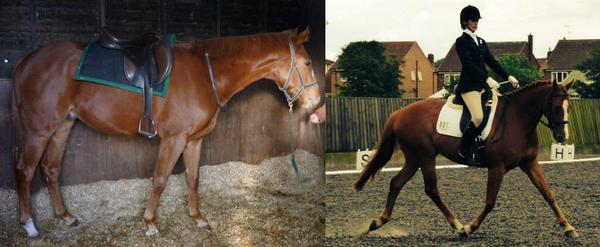
Thoroughbreds are a versatile breed and after racing, many go on to have successful careers in eventing, dressage, show jumping and as pleasure horses.
Every year over 3,000 horses leave behind their racing careers in search of a new job. Some are youngsters, others will have raced successfully for many years and like any great athlete, retirement beckons and a new quieter life is required.
Once out of training, most racehorses will settle down and adapt to their new life, new routines, environments and provide many years of happiness. We spoke to some Harry Hall One Club members with ex-racehorses and asked for their top tips, they’ve been there, done that and earned the t-shirt:
Sandra – turn them out! Whether you rehome a youngster or a horse who’s raced for years it’s a good idea to give them some time to chill out in a field and remember how to be a horse. A bit of grass will help them put on weight so when it comes to the nuts and bolts of retraining, they’ll have a bit more strength to cope with the different type of work
Georgie – get them used to being tied up outside the stable or lorry. It’s more than likely they will not have been tied up while at a racing yard as when you think about it – why would they – they’re always on the go! Tie some string to a stable tie up ring and start by leaving them for short periods then steadily build up the time until you’re confident they’re happy being tied up while you groom them and crack on with yard jobs.
Gary – they won’t be used to horses coming towards them in an arena. This took me by surprise the first time I rode my horse in a collecting ring, he freaked out when he was sandwiched between a horse coming towards him and the arena wall. When I thought about it afterwards it all made sense – they’re so used to horses going the same way as them. It’s like us driving down the road side of the road – terrifying!

Beth – they’re often used to traffic, tractors and lorries but riding past a playground with lots of children making loud noises could take them back to their racing days. Be mindful of this and be selective about where you hack out to begin with.
Rachel – feed them biotin! As racehorses they will have had shoes on from a young age so their hooves can be weak and if you want a set of shoes to last six feed some biotin for a few months and apply Mastacare hoof oil with added cod liver oil to help their hooves flourish.
Mark – long rein if you have a safe environment to do so. As a racehorse in training they will have been used to following horses all their lives. Long reining will teach them to walk on in front and on their own. Start by having someone walk alongside to build confidence and help with straightness, once your horse know what it’s doing try going solo in the arena and on a quiet country lane if you have one nearby.
Louise – buy some sticky bum jodhpurs! You’ll more than likely have some “fun” moments to sit through as your ex-racehorse learns the ways of the world. Try the Farnell Grip Seat Breeches – you’ll be thankful for them – I was!
Julie – my experience of ex-racehorses is that they can be accident prone! You’ll want a good vet fees insurance policy when the inevitable field accident happens. I’m looking into getting the horse insurance policy at Harry Hall myself for field mishaps.
Places to look for more information and sourcing a racehorse:
